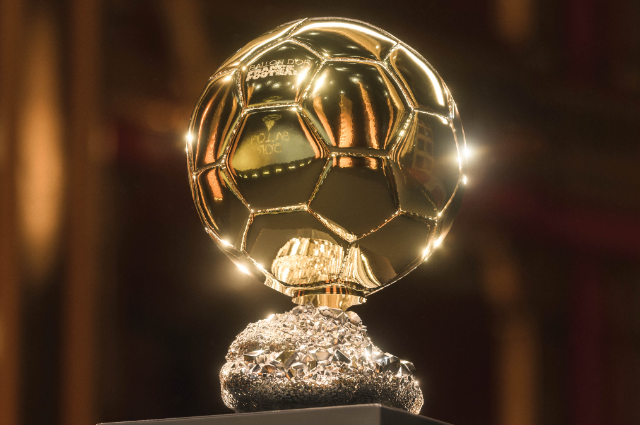When we talk about players and their greatness, a question always arises: how great they really are and what makes them great. And almost for sure, the words “Ballon d’Or” arise. A significant criterion for measuring how great a player is since 1956, we speak of Lionel Messi’s greatness by mentioning the absurd number of eight Ballon d’Ors he has won without a second thought, followed by Ronaldo’s remarkable achievement of five Ballon d’Ors. These numbers aren’t just trivia—they define who the legends are.
Created by France Football magazine, the Ballon d’Or—originally for only Europeans, later decided regardless of one's nationality and league—turned out to be one of the most prestigious individual awards a player could have. From only the whites fighting for it, now we have two players of African descent trying to reach the pedestal of greatness, their eyes glaring at the Ballon d’Or. One is the teenage prodigy Lamine Yamal, dazzling the world with his unteachable flair and raw skill. The other, Ousmane Dembele, has risen from the ashes, bouncing back from a difficult stint at Barcelona and now reclaiming his status as one of the most dangerous players in Europe.
With the 2024-25 season coming to an end, the internet is swarmed with a question: “Who deserves the Ballon d’Or?” It isn't a question of “Who will,” but rather a question of “Who is more deserving”—Ousmane Dembele or Lamine Yamal.
How does a player fit the criteria of a Ballon d’Or winner? France Football mainly focuses on three main aspects. First, the individual performance of the footballer, arguably the most critical aspect, includes consistency, big moments, how clutch a player is, along with goals, assists, and clean sheets. Second, the overall team success achieved in the season matters a lot, whether it's the Champions League, domestic leagues, or major international tournaments. Of course, just being on the winning team isn’t enough; what counts is the player’s influence in achieving that success. Third comes the aspect of class and fair play. It isn't just stats that matter, but sportsmanship displayed on the pitch, professionalism, and off-pitch conduct—all factor in.
But is that it? In recent years, stats alone aren’t enough anymore to decide the winner. Narratives and an overall influence over the footballing world hold leverage in the rankings. The 2023 Ballon d’Or, won by Lionel Messi, serves as an example. Despite playing in MLS for the second half of the season, Messi claimed the award largely because of the emotional weight it carried and legacy-defining performances at the World Cup.
This moment in history is crucial when evaluating the cases of Yamal and Dembele, especially when one offers a season full of magic at the age of 17, while the other delivers silverware and stability at the highest level. In this era, both stories weigh a lot, and both have an appealing case to present.
Ousmane Dembele played a mere thirty-three matches across all competitions, finding the net thirty-three times and providing for his teammates thirteen times throughout the season. Starting the season poorly did not stop Dembele by any means. He was a phoenix—what seemed to be disastrous turned out to be an unstoppable force, a force European football wasn’t ready to deal with. Like Xavi said, “Dembélé can play at a 10/10 level or a 2/10 level. And the goal is to make it more and more often a 10/10 rather than a 2/10.” While Xavi couldn't make him a 10/10 player, Luis Enrique succeeded in creating a player capable of winning the Ligue 1 Player of the Year, along with the Champions League Player of the Season.
Dazzling the French crowd with his explosive acceleration and pinpoint finishing, his sheer determination to win a match, pressing hard even at the very end, has certainly earned respect within the footballing world. It is not just individual merit that he has. Luis Enrique’s men have given the Parisian crowd a feast to devour upon—the Ligue 1, Coupe de France, the Trophée des Champions, and the Champions League to cap it off. Luis Enrique’s men have won everything they could, with Dembele being a strong contributor.
It would be a very easy victory for Ousmane Dembele, but of course, the likes of Lamine Yamal exist.
Amassing a total of fifty-five appearances across all competitions, along with eighteen goals and twenty-five assists to add to his resume, starting strong since his debut itself, Lamine has been an unstoppable force of nature, staying consistent game after game after game. A phenom found by Xavi and polished into a sharp dagger by Hansi Flick, Yamal remains a strong contender.
Although the Champions League was lost, the Catalans weren’t without success. A domestic treble was added to Lamine’s resume of greatness, with him playing a significant role in their success. And not only did he achieve success within the club, but also on the international stage. He made his mark internationally, leading Spain to a marvellous Euro victory, that too while providing a front-row seat to his fellow contender, Ousmane Dembele of the French national team.
We fans have been treated to another great final between two players of the highest level, going head to head once again—Dembele given a chance for redemption and Lamine a chance to further solidify his spot as a winner, a chance to be witnesses of the new era as Spain takes on France in the Nations League Semi-final this Thursday.
Regardless of who wins the Ballon d’Or, it would be met with both scrutiny and acceptance. That’s how deserving it is for both of they. Will we need to be reminded of the fact that Lamine Yamal is a 17-year-old boy, or whether the Champions League is that crucial in deciding the winner?
One thing is sure, though—this is the ceremony that ushers us into the new era of football, an era without the likes of Messi and Ronaldo.

